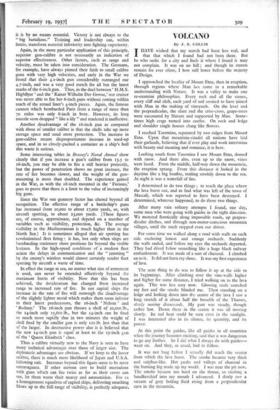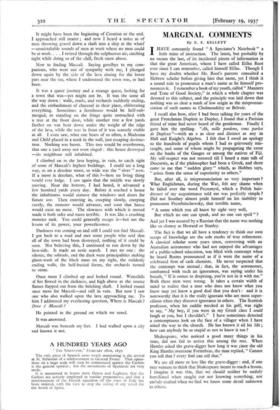VOLCANO
By J. S. COLLIS
T HAVE wished that my search had been less real, and I that that which I found had not been there. But he who seeks for a city and finds it where I found it may not complain. It was on no hill ; and though its streets remain for ever silent, I bow still lower before the majesty of Design.
I approached the locality of Mount Etna, then in eruption, through regions where Man is come to a remarkable understanding with Nature. It was a valley to make one re-examine philosophies. Every rock and all the stones, every cliff and cleft, each yard of soil seemed to have joined with Man hi the making of vineyards. On the level and the perpendicular, the slant and the criss-cross, grape-trees were succoured by Nature and supported by Man. Some- times high crags turned into castles. On rock and ledge and shoulder single houses clung like flowers.
I reached Taormina, separated by two ridges from Mount Etna. Upon that mountain-citadel all nations have laid their garlands, believing that if ever play and work intertwine with beauty and meaning and romance, it is here.
Looking south from Taormina I saw Mount Etna, domed with snow. And there also, even up to the snow, vines were laced. From the middle, half-way down the mountain, the eruption sprang. From this distance it looked in the daytime like a big bonfire, trailing smokily down to the sea. At night it was a waterfall of fire.
I determined to do two things ; to reach the place where the lava burst out, and to find what was left of the town of Mascali, which was reported to have been destroyed. I determined, whatever happened, to do those two things.
After many vain solitary attempts I found, one day, some men who were going with guides in the right direction. We motored frantically along impossible roads, up perpen- dicular ditches, and through non-motor-conscious mountain villages, until the track stopped even our driver.
For some time we walked along a road with walls on each side enclosing lemon and orange orchards. Suddenly the walls ended, and before my eyes the orchards departed. They had dived below something like a huge black railway embankment. It was made of a sort of charcoal. I climbed on to it. It did not burn my shoes. It was my first experience of lava.
The next thing to do was to follow it up at the side to its beginnings. After climbing over the vine-walls higher and higher for some distance, I tried walking on to the lava again. This was less easy now. Glowing coals scorched my feet and the smoke blinded me. Then standing on a ledge and looking down into the centre of the lava I saw a long stretch of it about half the breadth of the Thames, slowly moving downwards. My part was steady, though rather hot. Down there in the centre it was all moving slowly. Its red heat could be seen even in the sunlight. I was interested also in its silence, its quantity, and its power.
At this point the guides, like all guides in all countries when the journey becomes exciting, said that it was dangerous to go any further. So I did what I always do with guides— went on. And they, as usual, had to follow.
It was not long before I actually did reach the source from which the lava burst. The smoke became very thick and sulphur-like. Hot peaks and valleys of charcoal in the burning fog made up my world. I was near the pit now. The smoke became too hard on the throat, so sticking a handkerchief into my mouth I advanced. I dimly saw a stream of grey boiling fluid rising from a perpendicular cave in the mountain. It might have been the beginning of Creation or the end. I approached still nearer ; and now I heard a noise as of men throwing gravel down a shaft into a ship at the wharf —unmistakable sounds of men at work where no men could be at work.. . . I retired through the sulphurous air, catching sight while doing so of the chill, fresh snow above.
Now to finding Mascali. Saying goodbye to my com- panions, who were out of sympathy with me, I plunged down again by the side of the lava aiming for the lower part near the sea, where I understood the town was, or had been.
It was a queer journey and a strange quest, looking for a town that was—yet might not be. It was the same all the way down : walls, roads, and orchards suddenly ending, and the embankment of charcoal in their place, obliterating everything. Sometimes a farmhouse would be half-sub- merged, or standing on the fringe quite untouched with a tree at the front door, while another tree a few yards farther on was bent down under the weight of the edge of the lava, while the tree in front of it was scarcely visible at all. I even saw, what one hears of so often, a Madonna and Child placed in a nook in the wall, just escaping destruc- tion. Nothing was burnt. This tree would be overthrown, that one a yard away not even singed : this house destroyed —its neighbour still inhabited.
I climbed on to the lava hoping, in vain, to catch sight of some of Mascali's highest buildings. I could see a long way, as on a desolate moor, so wide was the " river " now. If a moor is desolate, what of this ?—here no living thing would ever lodge. I saw again that the middle was slowly moving. Near the bottom, I had heard, it advanced a few hundred yards every day. Before it reached a house the inhabitants would remove the windows and doors for future use. Then entering in, creeping slowly, creeping surely, the monster would advance, and soon that house would exist no more. The slowness with which it moved made it both safer and more terrible. It was like a crushing monster tank. You could generally escape it—but not the lesson of its power, your powerlessness.
Darkness was coming on and still I could not find Mascali. I got back to a road and met some people who said that all of the town had been destroyed, nothing of it could be seen. Not believing this, I continued to run down by the lava-side. It made an eerie search. I met no one : the silence, the solitude, and the dusk were principalities making ghost-work of the black mass on my right, the suddenly ending walls, the half-buried farms, the orchards turned to stone.
Once more I climbed up and looked round. Waterfalls of fire flowed in the darkness, and high above at the source flames flapped out from the belching shaft. I looked round once more for Mascali—and still in vain. But now I saw one who also walked upon the lava approaching me. To him I addressed my everlasting question, Where is Mascali ?
Dove i ?
He pointed to the ground on which we stood. It was answered.
Mascali was beneath my feet. I had walked upon a city and known it not.















































 Previous page
Previous page